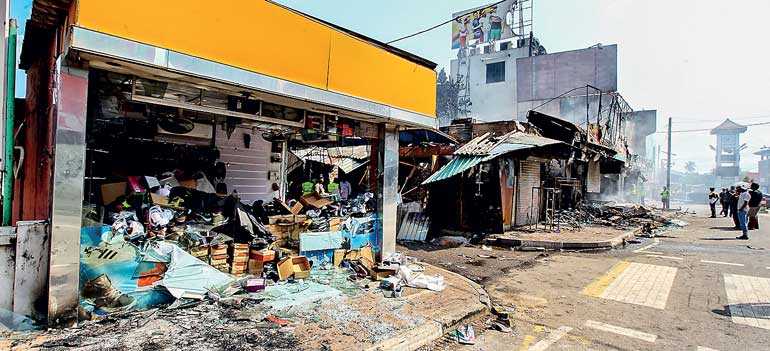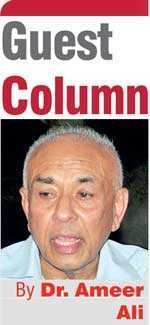Sunday Feb 22, 2026
Sunday Feb 22, 2026
Tuesday, 18 June 2019 00:00 - - {{hitsCtrl.values.hits}}

From the time of S.W.R.D. Bandaranaike’s election victory in 1956, one and only one issue had dominated political party campaigns in this country; and that was communalism. The Tamil community was the main focus of these campaigns for over 50 years. That ultimately drove the country to a 30-year civil war, the cost of which is inestimable in real terms. The Tamil issue has now been exhausted and lost much of its voter attraction, although now and then certain political heroes of yesteryear are trying to revive it.
After 2009, and especially since 2015, Sinhalese politicians were on the lookout for another target to launch a new scare campaign, which they found in the Muslim community. Just as the Tamil threat was packaged and sold in terms of political and cultural domination over the Sinhalese, the Muslim threat is now coloured in terms of commercial and demographic domination. Thanks to the Easter carnage by Zahran & Co., the details of which are painfully emerging, Muslim terrorism has added another hue to the anti-Muslim campaign.
In the meantime, none of the political parties are talking about real issues such as the economy, health, education, the environment and so on, which are of more immediate concern to the people. Even in the past, except for the leftists, no other party leader ever fought an election battle focused on real issues. Today, all three parties that are vying for power, the UNP, SLFP and LPP are so unanimous in embracing the open economy paradigm that they are prepared to progressively roll back the public sector from economic participation and management.
Therefore, they have nothing constructive to offer to the people except to sell the Muslim threat. One would have thought that at least JVP, with its romantic attachment to Marxism, would be a credible alternative with a constructive economic agenda. Disappointingly, that too is infected with the communal virus. The far right of course is bankrupt of any constructive policies. This then is the nation’s state of play today.
Caught among three hegemons
What will be the consequences? It was the continuous refusal to treat the Tamil minority with some dignity and agree to some form of power sharing that ultimately brought the civil war, and, as a consequence brought the Chinese to own part of Hambantota for 99 years. Will they ever leave the country? God only can answer that question.
Similarly, Indian influence in Sri Lankan affairs has increased quite significantly after 2009. It has become almost a ritual for Sri Lankan Presidents and Prime Ministers to visit Delhi to seek blessing from the head of that country before taking any action at home. Thiruppathy for religious blessings and Delhi for political blessings have become centres of political pilgrimage for Sri Lankan leaders.
India wants to counterbalance Chinese presence in the island by acquiring long-term assets at least similar to Hambantota. Prime Minister Modi did not visit the country last week just to say hello to Sirisena and company. Sri Lanka is well and truly trapped in Indo-Chinese geopolitics.
With the terrorist attack on Easter Sunday, the US, the third and a most powerful domineer, is bound to magnify the so-called international Muslim terror threat in order to extract concessions for docking facilities to its naval fleet in Trincomalee. (After all, it is US imperialism that produced the jihadists and counter-jihadists in the first place, and now the threat of international jihadism is a marketing tool for US foreign policy makers to gain permanent footholds in strategically placed and economically and politically vulnerable countries like Sri Lanka.) The US Secretary of State Michael Pompeo is soon to arrive following Modi. How long can Sri Lanka resist American demand and pressure? The country is now caught among three hegemons.
Sri Lankan economy paying a heavy price
The Sri Lankan economy in the meantime, is paying a heavy price partly because of a dysfunctional government and partly because of continuing communal tensions and violence. However much the Governor of the Central Bank may try to sanitise the parlous economic situation, and declare that the nation’s macroeconomic foundations are solid, the actual suffering of the people tell a different story. Daily escalating cost of living, mounting personal debt and rise in poverty rate, all leading to increase in suicide rate are symptoms of a rapidly declining economy. It is this economic hardship that is partly feeding the communal virus.
When there is plenty to go around in a family no sibling is going to complain when one of them grabs a little more. Only when there is little to share the quarrel begins. This is true of the economy as a whole. Throughout history when economies prosper and when there was plenty to share plural polities enjoyed peace and tranquillity. In times of adversity they faced upheavals and pluralism faced jeopardy.
This has been the story of Sri Lankan pluralism over the last several decades. Communalism weakens the economy and that weakness in turn feeds communalism. This link has to be severed if the country’s plural society is to survive. One country that realised this truth quite early in its creation is Singapore under Lee Kwan Yew. This was why in the 1980s when he addressed the nation he warned the Chinese majority not to turn Singapore into a Sri Lanka with their chauvinistic demands. By taking that stand he proved that he was a statesman more than a politician.
Cutting corners
From the 1950s and ’60s and with few exceptions Sinhalese politicians blamed every other community for the development gap between the majority and minorities. Without taking hard decisions to close the gap they started cutting corners and played a zero-sum game with a communal bias. It was the Tamils then and Muslims now. Whom will they blame next, Indian Tamils?
The fundamental issue facing the country is nation building. The nation is already showing signs of a soft apartheid, and before it becomes hardened let sanity prevail and stop the nation from fracturing irreparably. Foreign powers would love this fracture because, they could play one against the other and continue to keep the nation poor, week and unsettled, so that local power holders would dance to the foreigners’ tune.
On the current anti-Muslim wave quite a lot has been said about the need for reforms within the Muslim community. But no community will undertake internal reforms when it faces existential threat from outside. In that context even advocators of reforms would be considered traitors by their own community.
The country’s economy should be built and that needs the co-operation of all communities. An economy is not simply a matter of statistics and models but a lot more than that. It is all about people. They are the creators and beneficiaries of the economy. When they live in fear and anxiety no economy can prosper. Those who are obsessed with preserving religion and culture must first understand that people’s belly must be full to practice the faith and enjoy culture.
This is not to preach crass materialism, but to inject a rational outlook about human life. Sri Lankan politicians, if they really care for a better future for the country and its people, must expedite the process of reconciliation with Tamils and protect the Muslims from the hands of marauding thugs, some of whom are in saffron robes.
There are some positive signs, such as for example, several civil right groups are coming forward to speak out against the divisive trend. Even some influential prelates are now realising that things have goon too far and to a dangerous point. Sooner they all act together better for the nation to recover its prestige.
(The writer is attached to the School of Business and Governance, Murdoch University, Western Australia.)